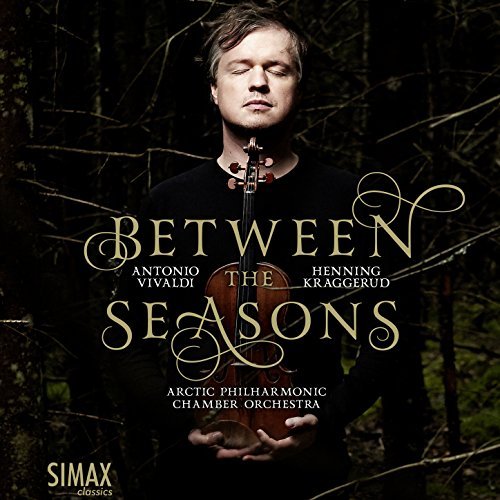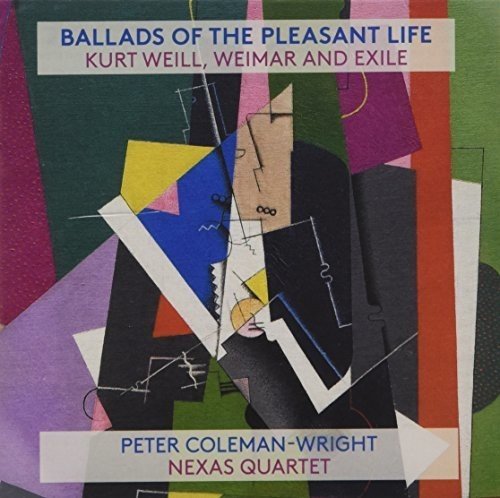Classical CDs Weekly: Sibelius, Vivaldi, Weill | reviews, news & interviews
Classical CDs Weekly: Sibelius, Vivaldi, Weill
Classical CDs Weekly: Sibelius, Vivaldi, Weill
Neglected piano music, baroque violin concertos and songs from the Weimar Republic

 Sibelius: Piano Music Leif Ove Andsnes (Sony)
Sibelius: Piano Music Leif Ove Andsnes (Sony)
Yes, Sibelius did write piano music, though not a lot of it gets heard. A recent BIS collection featured original pieces and transcriptions played on the composer's own piano, and Glenn Gould recorded a small selection in the 1970s. So Leif Ove Andsnes’s glorious disc fills a useful gap, but it's not just for completists. Sibelius himself famously complained that the piano “doesn't sing”, and Andrew Mellor's perceptive booklet essay describes the piano output as a chronically neglected secret. Andsnes's collection spans Sibelius’s career, opening with an irresistible, if untypical Impromptu in B minor. The three short pieces which make up 1904’s Kyllikki are better known, though the tiny, pared-down Barcarola from the Op. 24 Ten Pieces sounds more characteristic. As does the Sonatina No 1 from 1912, its compact, spare slow movement clearly related to Sibelius's Symphony No 4.
Two tree-themed pieces charm, as do a set of warmly accessible bagatelles composed in 1920 with an eye on the domestic amateur market: the perennially cash-starved composer knew that piano miniatures would generate more in royalties than an austere symphony. The very best comes last, in the shape of 1929’s Five Sketches. Andsnes is incredibly persuasive, especially in the penultimate “Song of the Forest”: two minutes of harmonically unsettling magic. He’s so right in referring to some of this music as inhabiting “a private world… something to play for a friend, or even alone.” You almost want to keep this disc to yourself, as a closely guarded secret. Wrong, of course – this wonderfully recorded collection deserves to sell in spades. Spread the word.
 Vivaldi: The Four Seasons Henning Kraggerud (violin), Arctic Philharmonic Chamber Orchestra (Simax)
Vivaldi: The Four Seasons Henning Kraggerud (violin), Arctic Philharmonic Chamber Orchestra (Simax)
This is subtitled Between the Seasons, Vivaldi’s ubiquitous concerto sequence interspersed with four short pieces by violinist Henning Kraggerud. We'll get to those later. He's partnered here by ‘the world’s youngest and northernmost orchestra”, the chamber incarnation of Norway’s Arctic Philharmonic. Naturally I turned to Winter first. Wrap up warm: this performance has even more shocks than Richard Tognetti’s Australian Chamber Orchestra recording. Yes, the ponticello strings at the concerto’s start aren't particularly authentic, but they're viscerally effective. Kraggerud's Largo is on the swift side, but it's warmly beautiful. The final minutes are extraordinary. If you respond positively to this reading, you'll enjoy the rest of the sequence.
I'm reluctant to give away too many surprises: suffice to say that the opening of Spring’s last movement had me collapsing in giggles, and that the storm sequence in Summer made my windows rattle. Kraggerud's flamboyant playing is always at the service of the music, and the orchestral playing is phenomenal. The modern interludes work well, welcome snatches of downtime in between the madness. None were originally composed for this record, Kraggerud inspired to insert them after hearing Gidon Kremer’s mingling of Vivaldi with Piazolla. Most touching is the third, the last leaf – Magnus in Memorium, a response to the premature death of the composer's musically talented cousin. Erik Fosnes Hansen’s discursive sleeve note is an enjoyable read, and Simax’s engineering is stunning.
 Ballads of the Pleasant Life – Kurt Weill, Weimar and Exile Peter Coleman-Wright (baritone), Nexas Quartet, Benjamin Burton (piano) (ABC Classics)
Ballads of the Pleasant Life – Kurt Weill, Weimar and Exile Peter Coleman-Wright (baritone), Nexas Quartet, Benjamin Burton (piano) (ABC Classics)
Blimey. Unwrap this disc and fast forward straight to track 20, an arrangement of the “Tango-Ballade” from Kurt Weill’s Threepenny Opera. Here it's performed by the Sydney-based Nexas Quartet. Not on strings, but saxophones. Words can't adequately sum up quite how marvellous it sounds, and it's dispatched with exactly the right amount of world-weary elegance. Ballads of the Pleasant Life deserves to be filed alongside Kate Lindsey’s recent Thousands of Miles; it too is a collection of Weimar Republic numbers, sung here by Australian baritone Peter Coleman-Wright. He really can do it all, whether luxuriating in Weill’s long lyrical lines or reeling off the names of Russian composers in the hysterical “Tchaikovsky”, from the Weill/Ira Gershwin musical Lady in the Dark. He throws in a wonderful “Ballad of Mack the Knife”, beginning austerely with a simple piano backing, switching to English half way through to the accompaniment of jaunty saxes.
It's not all Weill; a selection of workers’ songs includes Eisler’s “Song of the Miners” and a fascinating, dark “Song of the Cotton Packers” by Zemlinsky. Coleman-Wright throws in three bittersweet numbers by the Austrian operetta composer Robert Stolz, plus songs by Schreker, Schoenberg and Korngold. The booklet includes an interesting introduction by the great Barry Humphries, but doesn’t contain texts. A small gripe, as they're easily found online. Quite magical: I challenge anyone not to be bowled over by this disc.
Explore topics
Share this article
The future of Arts Journalism
You can stop theartsdesk.com closing!
We urgently need financing to survive. Our fundraising drive has thus far raised £49,000 but we need to reach £100,000 or we will be forced to close. Please contribute here: https://gofund.me/c3f6033d
And if you can forward this information to anyone who might assist, we’d be grateful.

Subscribe to theartsdesk.com
Thank you for continuing to read our work on theartsdesk.com. For unlimited access to every article in its entirety, including our archive of more than 15,000 pieces, we're asking for £5 per month or £40 per year. We feel it's a very good deal, and hope you do too.
To take a subscription now simply click here.
And if you're looking for that extra gift for a friend or family member, why not treat them to a theartsdesk.com gift subscription?
more Classical music
 Bizet in 150th anniversary year: rich and rare French offerings from Palazzetto Bru Zane
Specialists in French romantic music unveil a treasure trove both live and on disc
Bizet in 150th anniversary year: rich and rare French offerings from Palazzetto Bru Zane
Specialists in French romantic music unveil a treasure trove both live and on disc
 Scottish Chamber Orchestra, Ibragimova, Queen’s Hall, Edinburgh review - rarities, novelties and drumrolls
A pity the SCO didn't pick a better showcase for a shining guest artist
Scottish Chamber Orchestra, Ibragimova, Queen’s Hall, Edinburgh review - rarities, novelties and drumrolls
A pity the SCO didn't pick a better showcase for a shining guest artist
 Kilsby, Parkes, Sinfonia of London, Wilson, Barbican review - string things zing and sing in expert hands
British masterpieces for strings plus other-worldly tenor and horn - and a muscular rarity
Kilsby, Parkes, Sinfonia of London, Wilson, Barbican review - string things zing and sing in expert hands
British masterpieces for strings plus other-worldly tenor and horn - and a muscular rarity
 From Historical to Hip-Hop, Classically Black Music Festival, Kings Place review - a cluster of impressive stars for the future
From quasi-Mozartian elegance to the gritty humour of a kitchen inspection
From Historical to Hip-Hop, Classically Black Music Festival, Kings Place review - a cluster of impressive stars for the future
From quasi-Mozartian elegance to the gritty humour of a kitchen inspection
 Shibe, LSO, Adès, Barbican review - gaudy and glorious new music alongside serene Sibelius
Adès’s passion makes persuasive case for the music he loves, both new and old
Shibe, LSO, Adès, Barbican review - gaudy and glorious new music alongside serene Sibelius
Adès’s passion makes persuasive case for the music he loves, both new and old
 Anja Mittermüller, Richard Fu, Wigmore Hall review - a glorious hall debut
The Austrian mezzo shines - at the age of 22
Anja Mittermüller, Richard Fu, Wigmore Hall review - a glorious hall debut
The Austrian mezzo shines - at the age of 22
 First Person: clarinettist Oliver Pashley on the new horizons of The Hermes Experiment's latest album
Compositions by members of this unusual quartet feature for the first time
First Person: clarinettist Oliver Pashley on the new horizons of The Hermes Experiment's latest album
Compositions by members of this unusual quartet feature for the first time
 Gesualdo Passione, Les Arts Florissants, Amala Dior Company, Barbican review - inspired collaboration excavates the music's humanity
At times it was like watching an anarchic religious procession
Gesualdo Passione, Les Arts Florissants, Amala Dior Company, Barbican review - inspired collaboration excavates the music's humanity
At times it was like watching an anarchic religious procession
 Classical CDs: Camels, concrete and cabaret
An influential American composer's 90th birthday box, plus British piano concertos and a father-and-son duo
Classical CDs: Camels, concrete and cabaret
An influential American composer's 90th birthday box, plus British piano concertos and a father-and-son duo
 Cockerham, Manchester Camerata, Sheen, Martin Harris Centre, Manchester review - re-enacting the dawn of modernism
Two UK premieres added to three miniatures from a seminal event of January 1914
Cockerham, Manchester Camerata, Sheen, Martin Harris Centre, Manchester review - re-enacting the dawn of modernism
Two UK premieres added to three miniatures from a seminal event of January 1914
 Kempf, Brno Philharmonic, Davies, Bridgewater Hall, Manchester review - European tradition meets American jazz
Bouncing Czechs enjoy their Gershwin and Brubeck alongside Janáček and Dvořák
Kempf, Brno Philharmonic, Davies, Bridgewater Hall, Manchester review - European tradition meets American jazz
Bouncing Czechs enjoy their Gershwin and Brubeck alongside Janáček and Dvořák
 Solomon, OAE, Butt, QEH review - daft Biblical whitewashing with great choruses
Even a top soprano and mezzo can’t make this Handel paean wholly convincing
Solomon, OAE, Butt, QEH review - daft Biblical whitewashing with great choruses
Even a top soprano and mezzo can’t make this Handel paean wholly convincing

Add comment